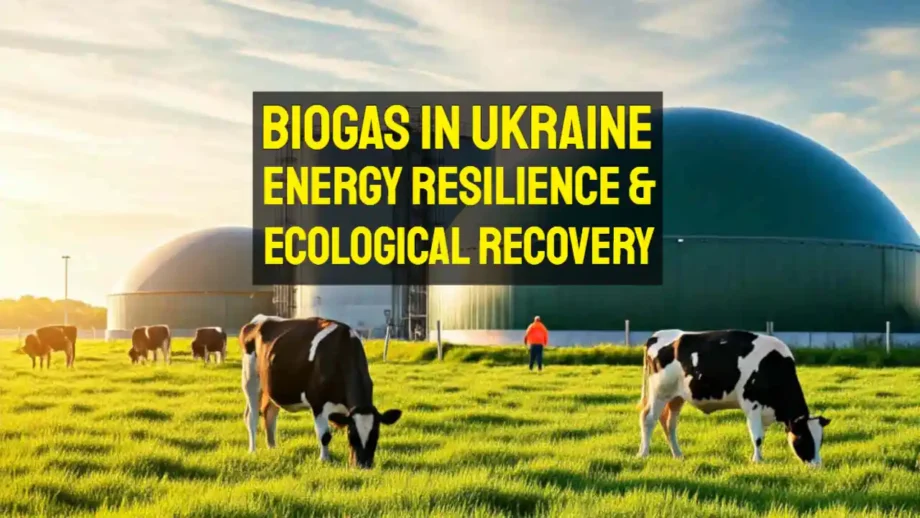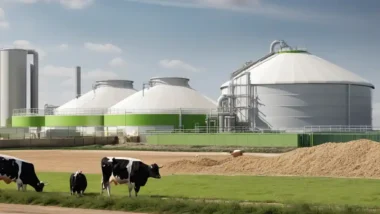With Ukraine's ongoing commitment to renewable energy, biogas has emerged as a pivotal player in the nation’s energy security and environmental strategy. As this sector evolves rapidly, understanding its potential and implications is crucial for all stakeholders involved.
What You Will Learn
- Biogas enhances energy security by reducing dependence on imported fuels and diversifying energy sources.
- The environmental benefits of biogas include reduced greenhouse gas emissions and improved waste management practices.
- Government policies, such as feed-in tariffs and subsidies, are critical in promoting biogas development and attracting investment.
- Investment opportunities in biogas projects can lead to economic growth, job creation, and rural development.
- Community engagement and public awareness are vital for the successful implementation and support of biogas initiatives.
- Technological advancements are improving the efficiency and scalability of biogas production in Ukraine.
- The future of biogas in Ukraine is promising, with ongoing investments signaling its role in achieving energy independence and sustainability.
Understanding the Landscape of Biogas in Ukraine
Ukraine is making significant strides in the biogas sector, which is an important part of its energy security strategy. Biogas, derived from organic materials, has the potential to provide sustainable energy while reducing dependence on fossil fuels. As the country navigates challenges such as energy supply and environmental concerns, understanding the landscape of biogas becomes crucial.
This renewable energy source not only helps in managing waste but also contributes to mitigating greenhouse gas emissions. By harnessing biogas, Ukraine can create a more resilient energy system, benefiting both the economy and the environment.
The Importance of Biogas for Energy Security
Biogas plays a vital role in enhancing Ukraine's energy security. As a domestically produced energy source, it reduces reliance on imported fuels, making the country less vulnerable to external shocks. The integration of biogas into the energy mix is a strategic move towards a more stable and sustainable energy future.
- Helps diversify energy sources
- Enhances energy independence
- Supports rural development
Moreover, utilizing agricultural and organic waste to produce biogas transforms potential pollutants into valuable energy. This process not only supports local economies but also promotes sustainable practices in agriculture.
Current Events Shaping the Biogas Sector
Recent developments in Ukraine have highlighted the growing focus on biogas production. Increased investments, government initiatives, and public awareness campaigns are creating a fertile ground for the sector to flourish. These events are pivotal in shaping the future of biogas in Ukraine.
- New legislation supporting renewable energy
- Partnerships with international organizations
- Increased funding for biogas projects
As these trends continue, they not only pave the way for innovation but also encourage collaboration among stakeholders. Together, they contribute to the overall growth and sustainability of the biogas sector.
Environmental Impact of Biogas Production
The environmental benefits of biogas production are significant. By converting waste into energy, biogas reduces landfill use and minimizes methane emissions, a potent greenhouse gas. This process not only aids in waste management but also promotes cleaner air and water.
- Reduces greenhouse gas emissions
- Improves waste management practices
- Enhances soil health through digestate application
Furthermore, biogas production supports biodiversity by fostering a circular economy where waste materials are reused. This sustainable approach can lead to a healthier ecosystem and a cleaner environment for future generations.
Government Support and Strategic Initiatives
The Ukrainian government recognizes the potential of biogas as a key player in the energy sector. With a strong commitment to renewable energy, various policies and initiatives have been introduced to support biogas development. These frameworks are designed to create a favorable environment for investment and innovation.
By aligning biogas projects with national energy goals, the government aims to enhance energy independence and promote sustainable practices across the country.
Policy Frameworks Guiding Biogas Development
Various policies are in place to guide the growth of the biogas sector in Ukraine. These frameworks aim to encourage investment, streamline regulations, and promote technological advancements in biogas production. Understanding these policies is essential for stakeholders looking to engage in this sector.
- Feed-in tariffs for renewable energy
- Subsidies for biogas technology
- Tax incentives for biogas projects
By leveraging these policies, developers and investors can capitalize on the opportunities within the biogas market, ultimately contributing to a more sustainable energy future for Ukraine.
Investment Opportunities in Biogas Projects
The biogas sector in Ukraine presents numerous investment opportunities. As the demand for renewable energy grows, investors are increasingly seeking projects that can deliver sustainable returns. Biogas initiatives not only create economic value but also align with global trends towards sustainability.
- Farm-based biogas facilities
- Waste treatment plants utilizing biogas technology
- Innovative biogas applications in urban areas
Investing in biogas projects can yield significant benefits, including job creation and rural development, making them attractive options for both local and international investors.
Energy Policy and its Role in Biogas Expansion
Energy policy plays a critical role in the expansion of biogas in Ukraine. By establishing clear goals and guidelines, the government can facilitate the growth of this renewable resource. The energy policy framework is designed to support innovation and ensure a reliable energy supply.
- Promotion of energy efficiency
- Encouragement of private sector involvement
- Investment in research and development
As energy policies evolve, they create pathways for the biogas sector to thrive, ultimately contributing to a more sustainable energy landscape in Ukraine.
Summarizing the Current State of Biogas in Ukraine
As we look at the current state of biogas in Ukraine, it's clear that the sector is gaining momentum. Recent developments highlight the increasing recognition of biogas as a viable and sustainable energy source. This shift is not only important for energy security but also for the environmental benefits it brings.
Key takeaways from the latest reports indicate that biogas production is steadily increasing, driven by technological advancements and governmental support. Moreover, local communities are becoming increasingly involved, contributing to both project execution and overall awareness about renewable energy.
Key Takeaways from Recent Developments
The biogas sector in Ukraine has seen significant changes over the past few years, and several points stand out. Firstly, advancements in technology have improved the efficiency of biogas production. Secondly, government policies have become more favorable, creating an environment conducive to investment. Lastly, community engagement is on the rise, leading to more grassroots support for biogas initiatives.
- Increased biogas production capacity through new projects.
- Improved energy security, reducing reliance on imported fuels.
- Government incentives for biogas investments and innovation.
- Growing public awareness and support for renewable energy sources.
The Future of Biogas in Ukraine's Energy Strategy
Looking ahead, the role of biogas in Ukraine's energy strategy appears promising. With ongoing investments and supportive policies, biogas can play a crucial role in achieving energy independence. Additionally, the focus on sustainable practices indicates a bright future for biogas as part of a broader renewable energy landscape.
Experts suggest that integrating biogas into the national energy mix is essential for both economic and environmental goals. This means that as a community, we need to stay informed and engaged with the developments in the biogas sector.
Engaging with the Biogas Community
One of the most effective ways to nurture the growth of biogas in Ukraine is by actively engaging with the community involved in its development. This includes not only industry professionals but also local farmers, environmentalists, and policymakers. Engaging in conversations around biogas innovations can spark new ideas and foster collaborative efforts.
Participation in forums, workshops, and online discussions can provide valuable insights into the latest trends in biogas technology and production methods. By sharing knowledge and experiences, we can all contribute to the growth of this vital energy source.
Inviting Discussions on Biogas Innovations
Let's open the floor for discussions! Engaging in dialogue about biogas innovations can lead to exciting new projects and partnerships. Sharing success stories and challenges faced can help others learn and adapt.
- Discuss your experiences with biogas projects.
- Share innovative ideas for improving biogas production.
- Explore collaborations with other stakeholders.
Encouraging Subscription for Ongoing Updates
To stay informed about the evolving biogas landscape, consider subscribing to updates from relevant organizations and platforms. Regular updates will keep you in the loop about the latest trends, policy changes, and new technologies. Engaging with the community through newsletters and social media can also provide continuous learning opportunities.
By staying connected, we can collectively enhance the biogas sector in Ukraine and work towards a sustainable future!
Biogas in Ukraine: Key Statistics and Insights
Environmental Impact
- Reduces greenhouse gas emissions
- Improves waste management practices
- Enhances soil health through digestate application
Government Support
- Feed-in tariffs for renewable energy
- Subsidies for biogas technology
- Tax incentives for biogas projects
Investment Opportunities
- Farm-based biogas facilities
- Waste treatment plants utilizing biogas technology
- Innovative biogas applications in urban areas
FAQs about Biogas in Ukraine
What is biogas and how is it produced?
Biogas is a renewable energy source produced through the anaerobic digestion of organic materials, such as agricultural waste, food scraps, and manure. This process generates methane, which can be used as a fuel for heating, electricity generation, and as a vehicle fuel.
Why is biogas important for Ukraine's energy security?
Biogas enhances energy security by reducing dependence on imported fuels, diversifying energy sources, and utilizing domestic resources. This makes Ukraine less vulnerable to external energy shocks.
What are the environmental benefits of biogas production?
Biogas production helps reduce greenhouse gas emissions, improves waste management practices, and enhances soil health through the application of digestate, a byproduct of the digestion process.
How does the government support biogas initiatives?
The Ukrainian government supports biogas development through policies such as feed-in tariffs, subsidies for technology, and tax incentives. These measures create a favorable environment for investment in the biogas sector.
What investment opportunities exist in the biogas sector?
Investment opportunities include farm-based biogas facilities, waste treatment plants utilizing biogas technology, and innovative applications in urban areas. These projects support economic growth, job creation, and rural development.






